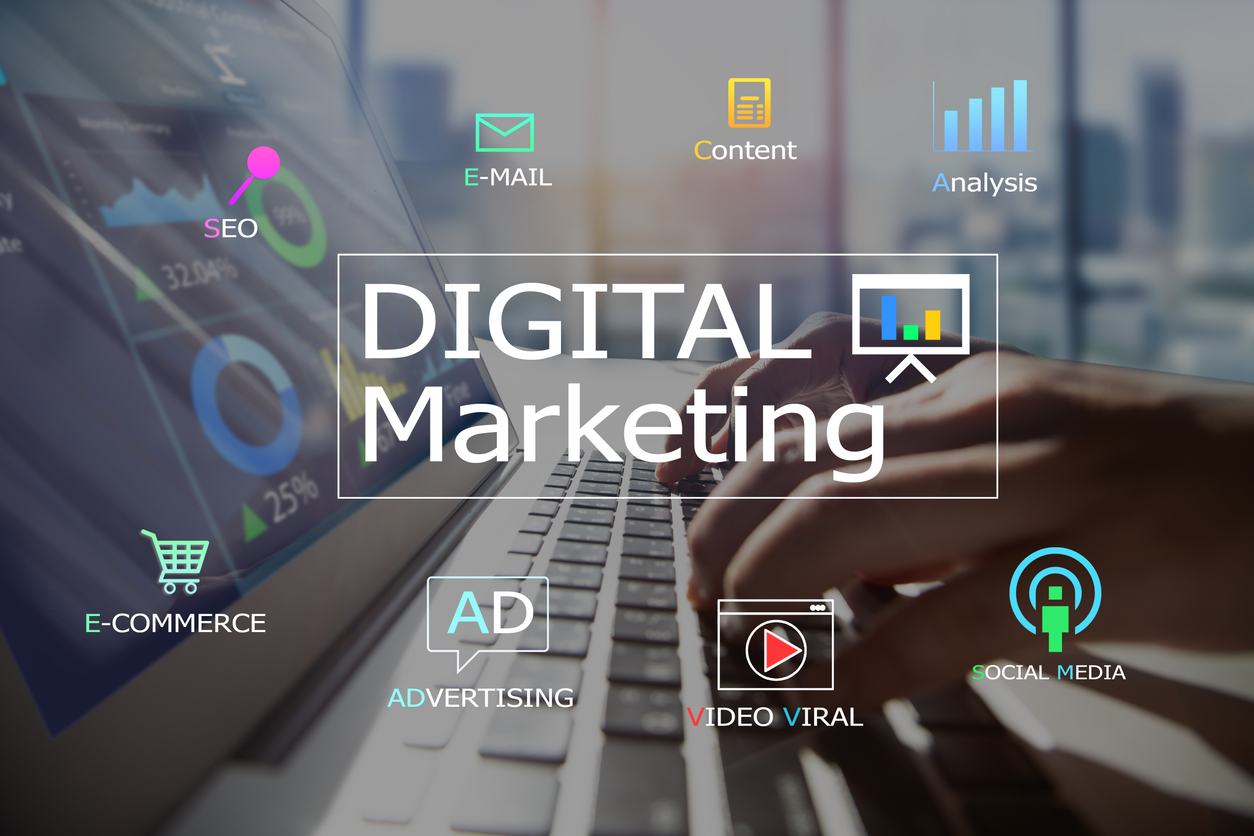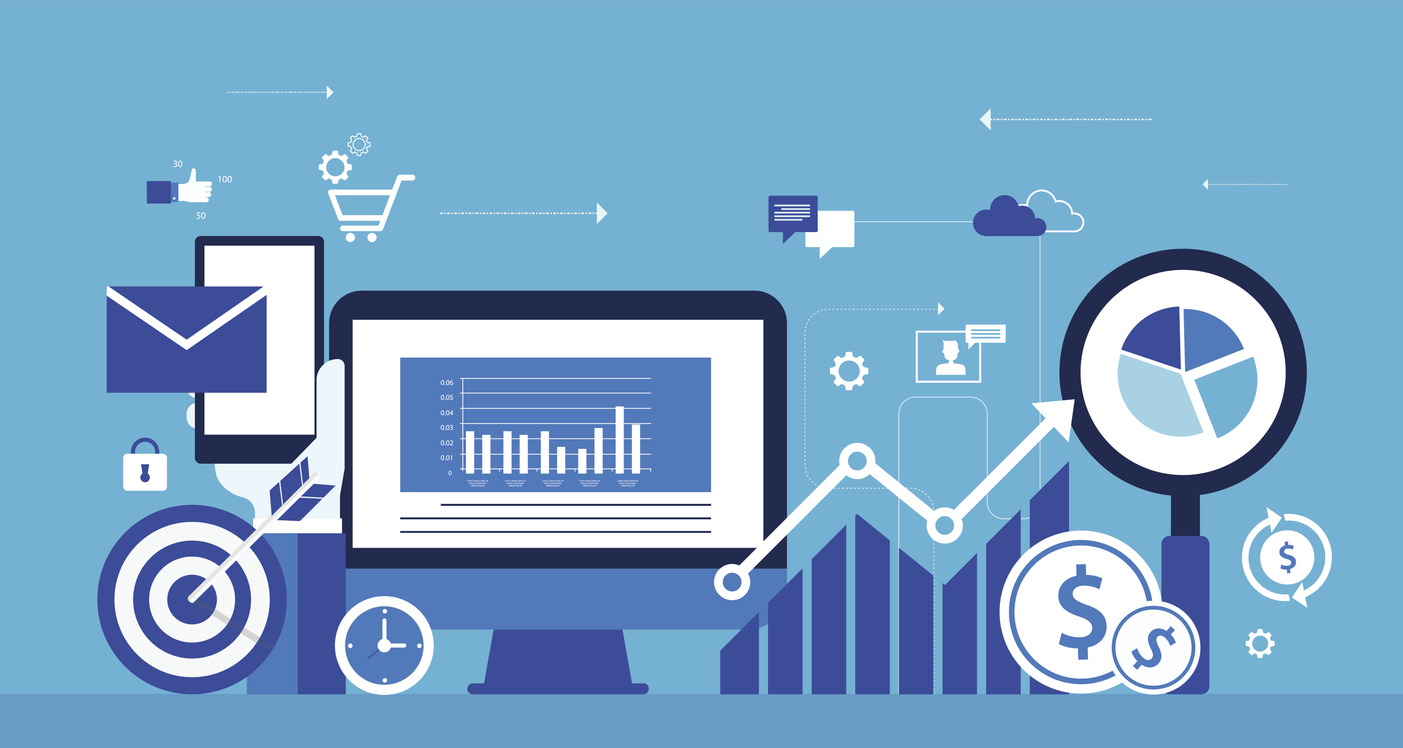
 STRATEGY CALL
STRATEGY CALL
In today's fast-paced, digitally driven world, businesses are increasingly turning to digital marketing as a powerful tool to connect with their target audience, build brand awareness, and drive business growth. But what exactly is digital marketing, and why is it so crucial in today's business landscape? In this comprehensive guide, we will explore the brass tacks of digital marketing, providing you with a solid understanding of its definition, key components, and why it’s so darn important. For a comprehensive digital marketing strategy for local small businesses consultation, call us today!
Digital marketing refers to the strategies and techniques used to promote products, services, and brands through the internet and other digital channels. These channels include websites, search engines, social media platforms, email, and mobile apps. Unlike traditional marketing methods that rely on print media or television ads, digital marketing leverages the power of the internet to reach a wider audience and engage with customers in a more personalized and targeted manner. Its scope encompasses various online activities, such as creating and optimizing websites, running online advertising campaigns, managing social media profiles, and crafting compelling content that resonates with the target audience.
A well-designed website serves as the foundation of any digital marketing strategy. It acts as a central hub where businesses can showcase their products or services and provide valuable information to potential customers, like a digital billboard for your business. Landing pages, on the other hand, are specific web pages designed to capture leads or prompt a desired action from visitors, such as signing up for a newsletter or making a purchase. A crucial element of a successful digital marketing strategy for local small businesses is optimizing your website not only for search engines but for user experience.
Website Optimization Considerations
SEO is the process of optimizing a website's content and on-page structure to improve its visibility on search engine results pages. By
incorporating relevant keywords, creating high-quality content, and enhancing the website's technical aspects, businesses can increase
their online presence, organic search rankings, drive more traffic, and attract qualified leads.
Search Engine Optimization (SEO) Best Practices

PPC advertising allows businesses to display their ads on search engines and pay only when a user clicks on their ad. This method offers precise targeting options, enabling advertisers to reach their desired audience based on demographics, interests, or search behavior. In fact, PPC ads are one of the most effective lead generation strategies, as your ads are displayed at the top of the search engine results, before the organic results.
Pay-Per-Click (PPC) Advertising Tactics
Content marketing is creating and distributing valuable and relevant content to attract and engage a specific target audience. This can take the form of blog posts, videos, infographics, or podcasts. By providing valuable information and establishing themselves as industry experts, businesses can build trust, increase brand authority, and drive customer loyalty.
Content Marketing Considerations
Social media platforms provide businesses with an opportunity to engage with their audience on a more personal level. It gives businesses an opportunity to give their followers a peek behind the curtain so to speak at the humans behind the business. Through creating and sharing compelling content, interacting with followers, and running targeted ads, businesses can build brand awareness, drive website traffic, and foster customer loyalty. Just be sure to be social on social media! It is named as such for a reason.
Social Media Marketing Techniques
Email marketing involves sending targeted messages and promotions directly to subscribers' inboxes. It's an effective way to nurture leads, build customer relationships, and drive conversions. By personalizing content and automating campaigns, businesses can deliver relevant and timely messages that resonate with their audience.
Email Marketing Strategies
These components can work together to build comprehensive strategies that are tailored to your business goals.
The first step in building an effective digital marketing strategy for local small businesses is to clearly define your marketing goals and identify your target audience. Your marketing goals should be specific, measurable, attainable, relevant, and time-bound, or SMART goals. Whether your objective is to increase brand awareness, generate leads, drive website traffic, or boost sales, understanding your goals will fuel your entire strategy. Additionally, identifying your target audience is imperative for tailoring your marketing efforts to reach the right people with the right message at the right time.
Market research and competitor analysis are crucial to gain insights into your industry, target market, and your competitors' strategies. By understanding market trends, customer behaviors, and industry benchmarks, you can identify opportunities for growth and potential obstacles. Analyzing your competitors' digital marketing strategies gives you a starting point, and allows you to uncover their strengths and weaknesses, helping you differentiate your business and develop a competitive advantage.
A buyer persona is a fictional representation of your ideal customer. It encompasses demographic information, psychographic characteristics, pain points, and purchasing behaviours. Developing a detailed buyer persona helps you understand your target audience on a deeper level and tailor your marketing messages and strategies to resonate with their specific needs and preferences. By aligning your marketing strategy with your buyer personas, you can create more targeted and effective campaigns.
With numerous digital marketing channels available, it's essential to select the ones that align with your goals and resonate with your target audience. Consider the nature of your business, your buyer persona's preferences, and the channels where your competitors are active. Whether it's search engine marketing, social media advertising, email marketing, or content marketing, choosing the right channels will ensure that your message reaches your audience effectively.

Digital marketing requires financial investment and resource allocation. Determine a budget that aligns with your marketing goals and the expected return on investment (ROI). Consider costs associated with advertising, content creation, marketing tools, and personnel. Allocate resources effectively, ensuring that you have the necessary skills and expertise to implement and manage your digital marketing initiatives. Keeping a close eye on your results through meticulous reports can help you determine how effectively you are spending your budget, and where adjustments need to be made.
To measure the success of your digital marketing strategy for local small businesses, set SMART goals and establish key performance indicators (KPIs). These measurable metrics will help you track progress, identify areas for improvement, and make data-driven decisions. Whether it's website traffic, conversion rates, social media engagement, or email open rates, set specific targets and regularly analyze your performance to optimize your strategy and achieve your desired outcomes.
By following these steps and building an effective digital marketing strategy, businesses can maximize their online presence, reach their target audience, and achieve their marketing objectives. Remember, digital marketing is an ongoing process that requires monitoring, analyzing, and adapting to changes in the digital landscape and consumer behaviors. With a solid strategy in place, businesses can leverage the power of digital marketing to drive growth and stay ahead of the competition.
Tracking and analytics are vital components of a successful digital marketing strategy for local small businesses. They provide valuable insights into the performance of your campaigns, allowing you to understand what works and what doesn't. By monitoring and analyzing data, you can make informed decisions, optimize your marketing efforts, and achieve better results. Tracking and analytics help you measure the return on investment (ROI) of your digital marketing initiatives and ensure that you are allocating resources effectively and make adjustments to your budget where its necessary.
To measure the effectiveness of your digital marketing efforts, it's crucial to identify and monitor key performance indicators (KPIs). KPIs vary depending on your marketing goals but may include metrics such as website traffic, conversion rates, click-through rates, engagement on social media platforms, email open rates, and revenue generated. By setting specific KPIs and regularly monitoring them, you can gauge the success of your campaigns and identify areas for improvement.

There are various tools and platforms available to help you track and report on your digital marketing performance. Google Analytics is a widely used tool that provides detailed insights into website traffic, user behavior, and conversions. Social media platforms offer built-in analytics that allow you to measure engagement, reach, and follower growth. Email marketing platforms provide data on open rates, click-through rates, and subscriber behavior. Digital marketing analytics can admittedly be complicated and confusing, even with the use of free tools. There is certainly no shame in partnering with a digital marketing agency to make sense of all the data that these programs provide you with and getting some assistance with best allocating your resources!
Collecting data is only the first step. The real value lies in analyzing the data and making data-driven decisions. Regularly review your marketing performance data and look for trends, patterns, and areas where you can optimize your campaigns. Identify what channels and strategies are delivering the best results and allocate resources accordingly. Experiment with different approaches, test variations, and use A/B testing to refine your tactics. By leveraging data and insights, you can make informed decisions that lead to improved digital marketing performance and drive better business outcomes.
Measuring and analyzing digital marketing performance is crucial for understanding the effectiveness of your campaigns and making data-driven decisions. By tracking key metrics, utilizing tools and platforms, and analyzing data, you can gain valuable insights into the performance of your marketing efforts. Armed with this knowledge, you can optimize your strategies, allocate resources effectively, and achieve your marketing goals. Remember that digital marketing is an ongoing process, and continuous analysis and optimization are essential for staying ahead in the ever-evolving digital landscape.

Digital marketing is a rapidly evolving field with new trends, technologies, and platforms emerging regularly. Ignoring these advancements can cause your strategies to become outdated and less effective over time. Stay updated on industry trends, follow thought leaders, and be willing to experiment with new tools and platforms. Embrace emerging technologies like artificial intelligence, voice search optimization, and interactive content. By staying informed and adapting to changes, you can stay ahead of the competition and leverage the latest digital marketing opportunities.
In all honesty, digital marketing can be a complicated beast to tame if it’s not your full-time job! When you’re a small to medium business owner, your plate is already pretty full being an expert in your own field! It’s a little unrealistic to expect you to master digital marketing as well. Fear not! You can partner with a digital marketing agency and take advantage of their expertise and leverage all of tools and subscriptions they have access to, often for a lower cost than the salary of an in-house marketer. For a digital marketing strategy for local small businesses consultation, call Smart WSI Marketing today!



